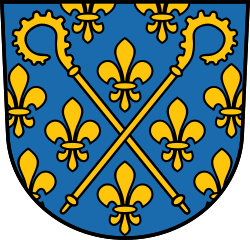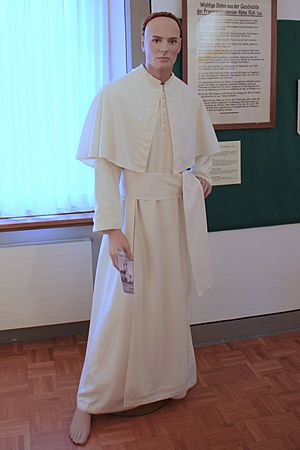Holy Trinity Abbey, Lough Key facts for kids
| Mainistir na Tríonóide | |

Arms of the Order of Canons Regular of Prémontré
|
|
| Monastery information | |
|---|---|
| Other names | Lough Key Abbey |
| Order | Order of Canons Regular of Prémontré (Premonstratensians) |
| Established | 1215 |
| Disestablished | 1608 |
| Mother house | Prémontré Abbey, Picardy |
| Diocese | Elphin |
| People | |
| Founder(s) | Clarus Mag Máilin |
| Architecture | |
| Status | inactive |
| Style | Norman |
| Site | |
| Location | Trinity Island, Lough Key, County Roscommon |
| Coordinates | 53°59′21″N 8°15′17″W / 53.989217°N 8.254697°W |
| Public access | yes |
| Official name | Trinity Abbey (Trinity Island) |
| Reference no. | 556 |
Holy Trinity Abbey was once a special kind of monastery called a priory in medieval times. It's also a National Monument in Ireland, found in a beautiful place called Lough Key. This old abbey was home to monks from the Premonstratensian Order.
Contents
Where is Holy Trinity Abbey?
Holy Trinity Abbey is on Trinity Island. This island is about 0.9 hectares (2.2 acres) big. It sits in the southern part of Lough Key, a lake in County Roscommon. The abbey faces a place called Rockingham House.
History of the Abbey
There has been a religious site on Trinity Island for a very long time. Monks lived here as early as the 7th century AD. You can still see parts of a church doorway from the 9th century.
Holy Trinity Priory was officially started in 1215. A man named Clarus Mag Máilin, who was an archdeacon, founded it. The island was a gift from Cathal O'Reilly, who was a king in the area. Some monks came from Boyle Abbey to live here in 1228. Around 1235, the priory became an abbey, which is a larger and more important monastery.
The monks here belonged to the Premonstratensian Order. They were also known as the "White Canons" because of the white robes they wore. They followed strict rules and lived a simple life.
In 1237, Holy Trinity Abbey helped start another monastery. This new monastery was located on Lough Oughter in County Cavan.
Monks and other religious people were buried at the abbey. There were also two cemeteries on the island. In 1436, a woman named Gormfhlaith died here. She was an anchoress, which means she lived a very strict, solitary religious life.
Archaeologists have found signs that a building north of the church burned down. It was rebuilt in the 15th century. Old records from 1466 confirm this fire. They said it was caused by "the carelessness of a woman."
The Annals of Loch Cé were written at Holy Trinity Abbey. These were important historical records. They covered events that happened between the years 1014 and 1590.
In 1548, the abbey was managed by Ruaidri mac Diarmata. He was the King of Moylurg. Later, in 1594, the abbey was given to a man named Robert Harrison. Sir Conyers Clifford was buried at the abbey in 1599.
The abbey owned land in places like Aghnasurn and Estersnow. The last monks left Holy Trinity Abbey in 1608. This happened when King James I took control of the monastery.
The Sad Story of Úna Bhán MacDermot
One special tomb on the island belongs to Úna Bhán MacDermot. Her name means "Fair Úna." She was the daughter of Brian Óg MacDermot, who was a king. Úna fell in love with Tomás Láidir Costello, a strong young man. But her father did not approve of their love. He refused to let Úna marry Tomás because Tomás's father was an enemy.
Úna was so heartbroken that she died. Tomás was very sad and swam across the lake to cry at her grave. Later, Tomás also died. He was buried right next to Úna. It's a famous sad love story from Irish history.
What We Found at the Abbey
In 1991, archaeologists dug up parts of the abbey. They found some interesting things. These included silver coins from the time of King Henry VIII and Queen Elizabeth I. They also found a bronze ferrule, an iron knife, and some nails. Pieces of pottery and parts of a rotary quern (a tool for grinding grain) were also discovered.
Buildings of the Abbey
The abbey was built using rocks found nearby. These rocks were pale grey sandstone and limestone. The church inside the abbey had special seats called sedilia. It also had a chapter room, which was a meeting place for the monks.
 | Selma Burke |
 | Pauline Powell Burns |
 | Frederick J. Brown |
 | Robert Blackburn |



